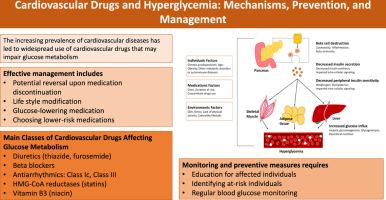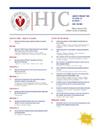The impact of cardiovascular drugs on hyperglycemia and diabetes: a review of ‘unspoken' side effects
IF 3
3区 医学
Q2 CARDIAC & CARDIOVASCULAR SYSTEMS
引用次数: 0
Abstract
Aims
The increasing prevalence of cardiovascular diseases has led to the widespread use of cardiovascular drugs that can adversely impact glucose metabolism. This review focuses on the latest evidence on the potential of cardiovascular drugs to induce adverse glycemic effects but also the underlying mechanisms, prevention, and management strategies.
Materials and methods
A comprehensive literature search was conducted across scientific databases until May 25th, 2024.
Results
Certain cardiovascular drugs can induce hyperglycemia through multiple mechanisms, including altered the secretion and sensitivity of insulin through direct cytotoxic effects toward pancreatic beta cells and increased glucose secretion. Notably, diuretics, beta-blockers, calcium channel blockers, and statins have been associated with significant glycemic disturbances. The risk of hyperglycemia varies based on individual factors, drug dosages, and concurrent medications. These drug-induced hyperglycemic effects may sometimes reverse upon discontinuation of related medication. Effective management should include lifestyle modifications, the use of glucose-lowering medications, and opting for lower-risk cardiovascular drugs. Monitoring for hyperglycemia involves educating affected individuals and conducting regular blood glucose tests. Identifying at-risk individuals and implementing preventive measures are crucial for improving both cardiovascular and metabolic outcomes.
Conclusions
Certain cardiovascular drugs significantly contribute to hyperglycemia and diabetes mellitus through various mechanisms. Effective management includes identifying at-risk individuals, choosing lower-risk medications, and implementing monitoring and preventive strategies. Further research is needed to fully understand these mechanisms and develop targeted interventions to prevent and manage cardiovascular drug-induced hyperglycemia, thereby improving clinical outcomes.

心血管药物对高血糖和糖尿病的影响:回顾 "难以启齿的副作用"。
目的:随着心血管疾病发病率的上升,可对糖代谢产生不良影响的心血管药物得到广泛使用。本综述重点关注心血管药物可能诱发不良血糖效应的最新证据,以及其潜在机制、预防和管理策略:在科学数据库中进行了全面的文献检索,直至 2024 年 5 月 25 日:某些心血管药物可通过多种机制诱发高血糖,包括通过对胰腺β细胞的直接细胞毒性作用改变胰岛素的分泌和敏感性,以及增加葡萄糖分泌。值得注意的是,利尿剂、β-受体阻滞剂、钙通道阻滞剂和他汀类药物与严重的血糖紊乱有关。高血糖的风险因个体因素、药物剂量和同时服用的药物而异。这些药物引起的高血糖效应有时会在停用相关药物后逆转。有效的管理应包括改变生活方式、使用降糖药物和选择风险较低的心血管药物。监测高血糖包括对患者进行教育和定期检测血糖。识别高危人群并采取预防措施对于改善心血管和代谢结果至关重要:结论:某些心血管药物通过各种机制导致高血糖和糖尿病。有效的管理包括识别高危人群、选择风险较低的药物以及实施监测和预防策略。要充分了解这些机制并制定有针对性的干预措施来预防和控制心血管药物引起的高血糖,从而改善临床疗效,还需要进一步的研究。
本文章由计算机程序翻译,如有差异,请以英文原文为准。
求助全文
约1分钟内获得全文
求助全文
来源期刊

Hellenic Journal of Cardiology
CARDIAC & CARDIOVASCULAR SYSTEMS-
CiteScore
4.90
自引率
7.30%
发文量
86
审稿时长
56 days
期刊介绍:
The Hellenic Journal of Cardiology (International Edition, ISSN 1109-9666) is the official journal of the Hellenic Society of Cardiology and aims to publish high-quality articles on all aspects of cardiovascular medicine. A primary goal is to publish in each issue a number of original articles related to clinical and basic research. Many of these will be accompanied by invited editorial comments.
Hot topics, such as molecular cardiology, and innovative cardiac imaging and electrophysiological mapping techniques, will appear frequently in the journal in the form of invited expert articles or special reports. The Editorial Committee also attaches great importance to subjects related to continuing medical education, the implementation of guidelines and cost effectiveness in cardiology.
 求助内容:
求助内容: 应助结果提醒方式:
应助结果提醒方式:


